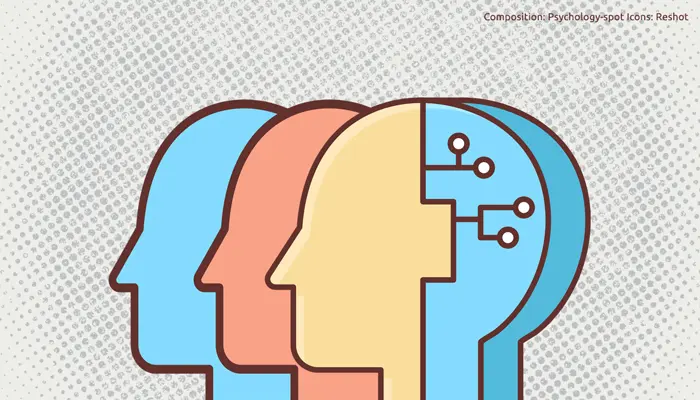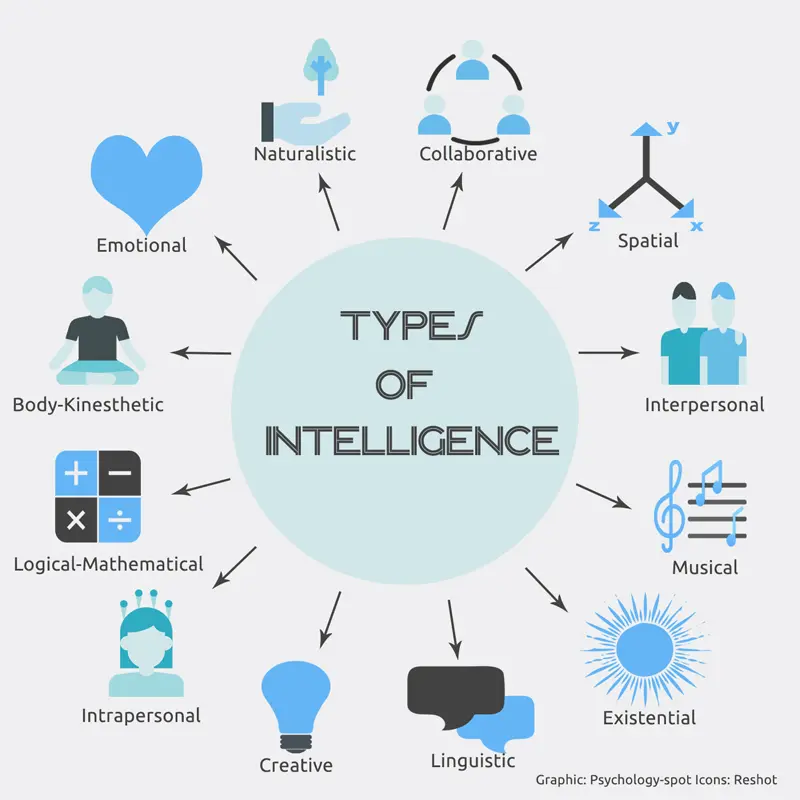
In 1983, the psychologist Howard Gardner proposed the existence of different types of intelligence. In his book “Frames of Mind” he postulated that intelligence is not a unitary set but rather a network of capabilities that work in a more or less synchronized way.
With his Theory of Multiple Intelligences he debunked the classical idea of intelligence, proposing that we are all skilled in different areas. There are people with a special talent for numbers and others who are excellent communicators.
Therefore, Gardner redefined the concept of intelligence as the “Biopsychological potential to process information that can be activated in a cultural setting to solve problems or create products that are of value in a culture.” Therefore, the type of intelligence that we develop will depend on both genetic factors and our experience.
The different types of intelligence that we can develop

At first, Gardner proposed the existence of 7 types of intelligence, but later he included two additional intelligences and with the passage of time other constructs have been added that expand our vision of intelligence.
1. Logical-mathematical intelligence
Logical-mathematical intelligence refers to the ability to analyze problems rationally, perform mathematical operations, and investigate scientific questions. It involves the ability to calculate, quantify, consider propositions and hypotheses, and perform complex logical operations.
These people use abstract and symbolic thinking, develop sequential reasoning skills, and follow inductive and deductive thought patterns. In fact, they have the ability to develop equations and proofs, do calculations and solve abstract problems so they are comfortable in the field of Mathematics and Physics.
2. Linguistic intelligence
Linguistic intelligence refers to a special sensitivity to spoken and written language. It manifests as the ability to learn languages and use language effectively to achieve certain goals. Writers and great communicators, for example, possess this type of intelligence.
People with linguistic intelligence use language to express and appreciate complex meanings. They have the ability to analyze verbal and non-verbal information with great precision, understand words and non-verbal language, and are also able to create products that involve oral and written language.
3. Spatial intelligence
Spatial intelligence implies the ability to recognize and manipulate patterns in a wide space, such as that used by navigators and pilots, as well as patterns in more confined areas, such as the case of sculptors, surgeons, chess players or architects.
This type of intelligence refers to the ability to think in three dimensions. People who have it have an extraordinary ability to recognize and manipulate detailed and large-scale spatial images. They also tend to have a very active imagination.
4. Body-kinesthetic intelligence
Kinesthetic or bodily intelligence is the ability to use the whole body or parts of it to solve problems or create products. People with this type of intelligence can become excellent athletes or dancers, for example, but they can also perform as surgeons, mechanics, physical therapists or carpenters.
People with bodily or kinesthetic intelligence solve problems through a deep mind-body bond. They achieve great control of automatic and voluntary movements, so that they can use their body in a highly differentiated and competent way to solve different problems.
5. Musical intelligence
Musical intelligence refers to the skills of interpretation, composition and appreciation of musical patterns. People with this type of intelligence have the ability to recognize and create musical tones, rhythms, and timbres.
They tend to have a great facility to learn songs and rhythms, as well as to compose music and play different musical instruments. They develop a special sensitivity to music and can easily detect incorrect pitches or out-of-tune instruments.
6. Interpersonal intelligence
Interpersonal intelligence is the ability to understand other people’s intentions, motivations, and desires and use them to assertively engage with others. People with this type of intelligence develop the ability to recognize and understand the psychological background of the others.
Interpersonal intelligence therefore implies the development of effective verbal and non-verbal communication. These people notice the differences between one another, are sensitive to the moods of the others and have the ability to manage different perspectives from an empathic posture.
7. Intrapersonal intelligence
Intrapersonal intelligence is fundamentally inward since it implies the ability to understand oneself. These people are not only aware of their wishes, feelings, moods and expectations, but they use that information to intelligently manage their lives.
Those who possess this type of intelligence also develop self-cognition; that is, they understand how their cognitive processes (thinking, attention and memory) work, which allows them to make better decisions and solve problems more effectively.
8. Naturalistic intelligence
Naturalistic intelligence is the ability to perceive the relationships between species and people, recognizing possible differences or similarities between them. These people are able to identify, discern, observe and classify members of groups or species of flora and fauna with relative ease.
However, those with this type of intelligence not only identify the variety that exists in the natural world, but also have a special sensitivity towards the environment. They have a natural curiosity to investigate their environment and be in contact with nature.
9. Emotional intelligence
Emotional intelligence could be considered as a conjunction of interpersonal and intrapersonal intelligences, it implies the ability to recognize and manage one’s own and other people’s emotions. Proposed by psychologists Peter Salovey and John Mayer, it is composed of five essential capacities: emotional self-awareness, emotional self-control, self-motivation, empathy, and social skills.
Therefore, emotionally intelligent people are aware of their moods and the emotions and feelings of those around them, being able to manage them assertively. These people have great emotional granularity and empathy, but they do not allow their emotions to overwhelm them but rather have the psychological resources to channel them properly.
10. Existential intelligence
Gardner defined existential intelligence as “The ability to locate oneself with respect to the cosmos and the existential features of the human condition, such as the meaning of life and death, the final destination of the physical and psychological world in deep experiences like love for another person”.
People who have this type of intelligence are likely to reflect on their existence and think about the meaning of life and what could happen after death. Not only do they have a rich spiritual life, but they develop a tendency to philosophize and question everything, based on their deep capacity for self-observation and observation of the environment.
11. Creative intelligence
Creative intelligence is the result of combining intellect with imagination to create an original idea or product. In fact, although intelligence involves solving problems, it does not always lead to original solutions. People with creative intelligence, on the other hand, think outside the box and often come up with novel solutions.
This type of intelligence implies the ability to go one step ahead and imagine multiple possibilities that have not yet materialized. These are people with open and flexible thinking who are able to see things from different perspectives to find unusual or novel answers.
12. Collaborative intelligence
In the organizational and social media environment, has emerged a new type of intelligence that refers to the ability to work as a team to achieve a common goal. Collaborative intelligence implies an orderly deliberation that allows a group of people to create better shared knowledge and make decisions, with greater possibilities of overcoming the challenges and difficulties posed by different human activities in an increasingly complex and changing environment.
It is a very special type of intelligence since it implies being able to work with others, share knowledge and ways of doing things, to achieve a common goal. In fact, it is an intelligence of an eminently practical nature since it is more oriented to action. These people are comfortable working with the others and do their best in these collaborative settings.
Are all these types of intelligence valid?
The Theory of Multiple Intelligences has been widely criticized. Many psychologists consider that these are talents, rather than intelligence in the strictest sense of the term. However, it is undoubtedly a daring proposal that differs from the classic conceptions of intelligence, since it is not limited to the skills that have been traditionally recognized as the manifestations of intelligence and that are usually rewarded in academic contexts.
The idea that there are different types of intelligence grants an equal status to other talents, abilities and capacities, which are not limited to logical-mathematical and linguistic intelligence. Therefore, the idea that there are different types of intelligence presupposes a revolution in the whole society by giving importance – or at least putting the focus – on skills less valued by the traditional scholastic system.
Sources:
Larivée, S. (2010) Las Inteligencias Múltiples de Gardner. ¿Descubrimiento del Siglo o Simple Rectitud Política? Revista Mexicana de Investigación en Psicología; 2(2): 115-126.
Chen, J. (2004) Theory of Multiple Intelligences: Is It a Scientific Theory? Teachers College Record; 106(1): 17-23.
Gardner, H. (1987) The Theory of Multiple Intelligences. Annals of Dyslexia; 37: 19-35.
Gardner, H. (1983) Frames of Mind: The Theory of Multiple Intelligences. Nueva York: Basic Books.




Andrei says
Interesting article ! I was really bad at maths while teenager so it gives me hope ?
ZeroGravityFire says
Yeah, I have at least 4 or 5 of those types, but I’m considered to be a “Jack of all trades”, type mostly, but my IQ is above Einsteins of 145 so I also have combined sense of regret and doubt formed by all of it which holds me back a lot, also, different types can emerge and disappear over the course of your life so your not stuck to 1 or 2 types by the end. No one cannot have them all at once, unless your IQ is over 200 and your also under 30 years old, lol
Vid Mulc says
It’s actually you’re*.
ZeroGravityFire says
The term ‘You’re means ‘You Are’ when I say “Your”, its means something in your life or something of yours you have either at home or on you. For example ‘You’re home’, im saying ‘You are home’. When I’m talking about the house you live in i say, “It’s ‘YOUR” house, if I were to use the definition you used, I’d be saying, “It’s ‘you are’ house”. Doesn’t sound right, does it? So you are wrong in this instance.
Henry says
The second one 🙂
andres calderon says
Coincido contigo en que pueden desaparecer, pero como dice en otros textos la Teoría de las Inteligencias Multiples no cuenta con fundamentos cientificos, y por las pruebas realizadas, más da a entender que se refiere a habilidades o talentos que a inteligencias, por tanto, la cuasa por las cuales estas inteligencias desaparecerían sería debido a que más que inteligencias fueran talentos, y los talentos sin práctica, se van desvaneciendo. Hace poco me realice una de las pruebas y obtuve puntaje perfecto en 4 inteligencias y 2 más como sobresaliente, las pruebas de IQ que practique oscila entre los 135 y 140, pero debo confesar que soy escéptico a todo esto porque si bien me destaco en varias areas, en la vida no logro las metas que quisiera, por tanto personalmente no me considero inteligente, aunque trabajo en eso.
ZeroGravityFire says
Your also forgetting about the other 3 types, Intuitive intelligence, (Being able to sence patterns around then and act either before or after an event occurs), Life intelligence, (Able to understand and to some extent controll all of the nuances and little things in life surrounding them), General intelligence, (A broad range of knowledge and intelligence from many types all rolled into one, like a jack of all trades, but master of none).
Norbert Johnson says
Without intelligence, none of the others can be realized
ZeroGravityFire says
Intelligence is the cornerstone of understanding, without it, nothing can be ever realised, it is not the ability to remember facts or figures accurately or with speed, it is something that only truly intelligent people can understand, others, it will leave them scratching their heads about it forever and just become a distant thought in the chaos of their mind and daily thought processes that they endure day after day, I don’t like to brag about my own I.Q. score, but it’s about 162 on my best days, other times it’s around 140, on lazy days, especially when I’m tired, it’s about 130, my memory is for shit and queries take time to go down the line and come back, like a slow processor filled up with junk and useless facts ect, but in the end I’m still smarter than the average bear! He’uk!
Ava says
Thank you for the article. I’d like to reference it. Could you please let me know the year of your writing. Much appreciated!
Jennifer Delgado says
Thank you! The date of publishing is: 2023/10 of april
Godwin Martins Kingmatthias004@gmail.com says
What of Divine Intelligence?
Thinking From the frequency of God and reproducing his results in your human realm of life.
It is directly proportional to your level of Faith and Walk with the The Divine And supreme being :God. This is the highest level of intelligence and operation sponsored through Faith in Jesus Christ His Son.
Godwin Martins
Godwin Martins Kingmatthias004@gmail.com says
What of Divine intelligence?
This is also known as the highest realm of intelligence. It is exhibited and operated by God Only.
Man functioned in this realm of intelligence in the garden of Eden before his fall through disobedience to God. This intelligence implies Thinking from the realm of God via the help of His Spirit at work in your life .
Divine intelligence is sponsored by Faith in Jesus Christ His Son through His finished work on the Cross of Calvary for all humanity.
Your degree of faith in the Word of God is directly proportional to your level or degree of Divine intelligence from God.
Shalom!